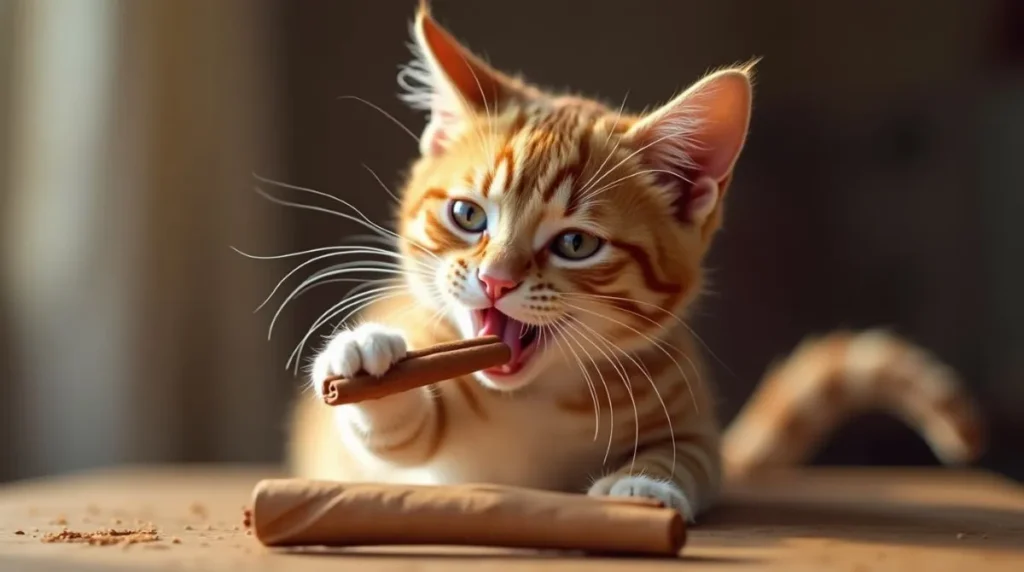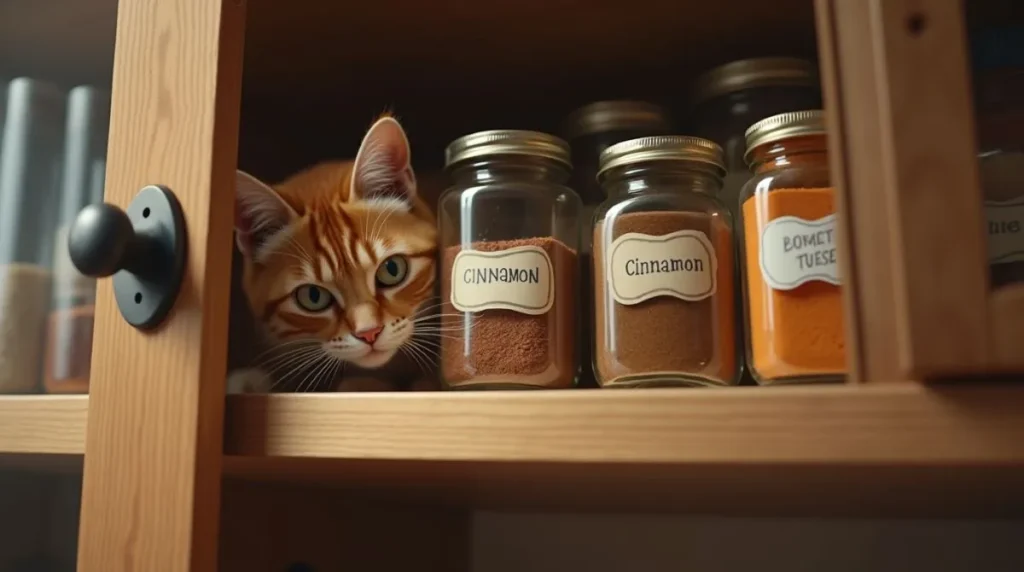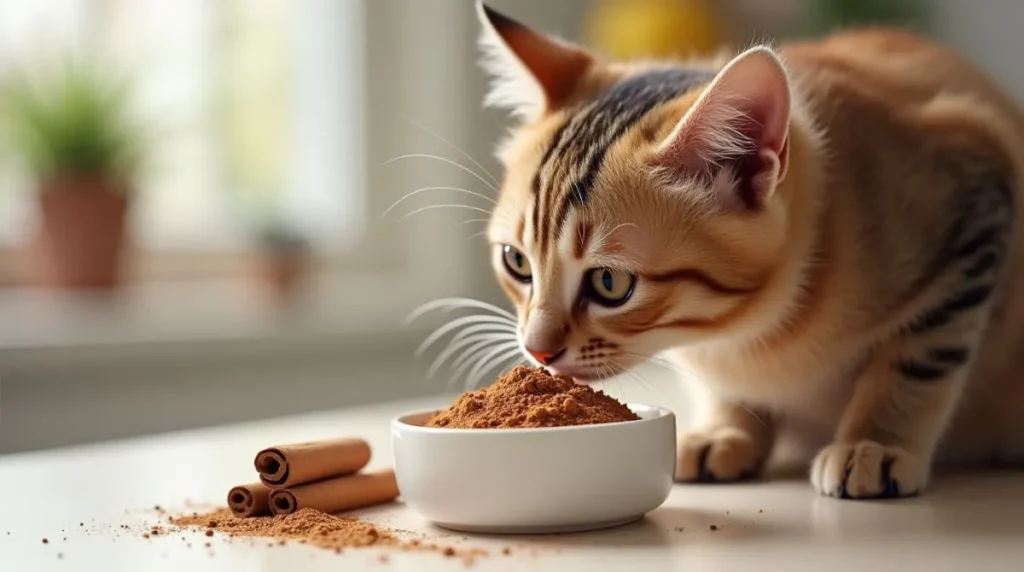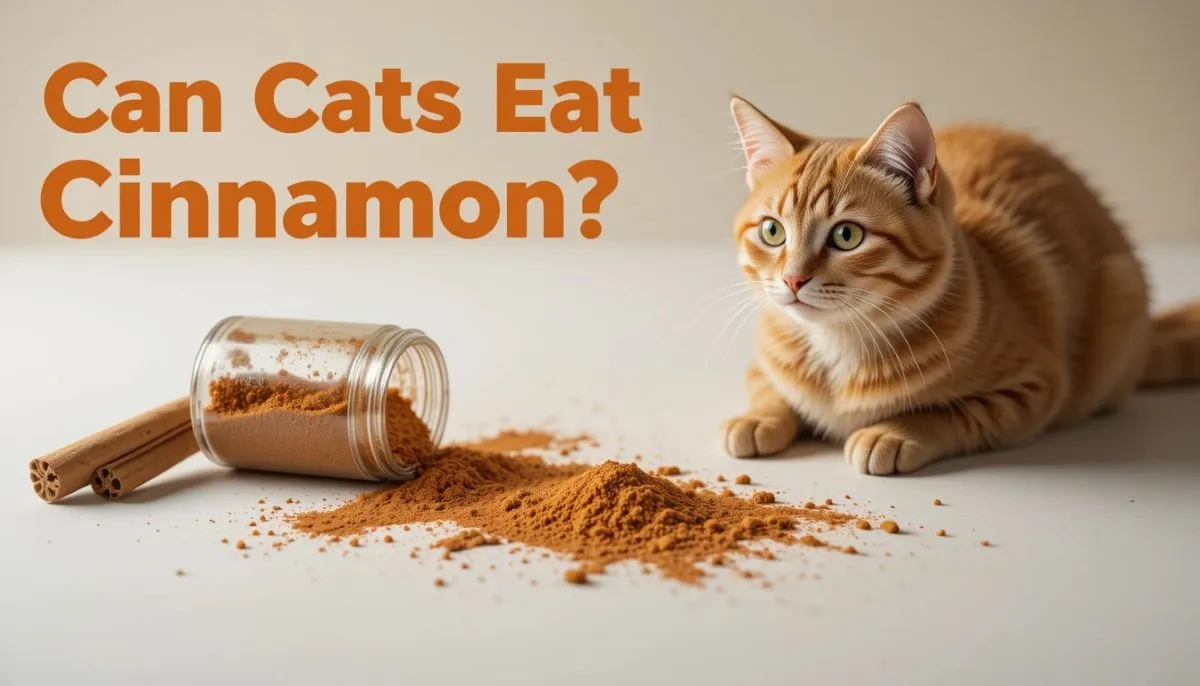Table of Contents
Cinnamon is a popular spice that adds warmth and flavor to our favorite dishes, but have you ever wondered, Can Cats Eat Cinnamon? While it’s safe for humans to enjoy this aromatic ingredient, pet owners need to understand how it affects their feline friends. Cats have sensitive systems, and certain foods can pose health risks if consumed improperly. In this article, we’ll explore whether cinnamon is safe for cats, potential dangers, and tips to keep your furry companion healthy. Let’s dive into the facts every cat owner should know!
Is Cinnamon Safe for Cats?
Cinnamon is a widely used spice in human cuisine, but its safety for cats is a topic of concern for many pet owners. While cinnamon is technically classified as non-toxic to cats, it can become harmful at certain levels-especially if your cat is exposed to large amounts. Understanding the potential risks and symptoms can help you make informed decisions about your feline friend’s health.
What Happens If a Cat Eats Cinnamon?
If your cat accidentally ingests cinnamon, it may experience mild to severe reactions depending on the amount consumed. Even small quantities can irritate their digestive system, leading to symptoms like vomiting or diarrhea. Larger doses can cause more serious issues, such as difficulty breathing or liver stress, since cats lack the necessary liver enzymes to metabolize cinnamon compounds effectively. Always monitor your cat closely if you suspect they’ve eaten cinnamon.
How Much Cinnamon Is Too Much for Cats?
There is no established safe dose of cinnamon ingestion for cats, so even a small amount could potentially pose risks. A pinch of cinnamon might be tolerated by some cats without immediate harm, but larger amounts-such as a teaspoon or more-can lead to toxicity. It’s crucial to avoid intentionally feeding cinnamon to your cat and to keep any cinnamon-containing products out of their reach to prevent accidental exposure.
Signs Your Cat May Be Sensitive to Cinnamon
Cats that are sensitive to cinnamon may exhibit signs of irritation or allergic-type reactions. These can include skin rashes, oral irritation, or respiratory distress due to inhaling cinnamon powder. Additionally, gastrointestinal upset, such as vomiting and diarrhea, is common after ingestion. If you notice these symptoms, consult your veterinarian promptly to rule out cinnamon toxicity or other underlying conditions. Early intervention can prevent complications and ensure your cat stays healthy.
Why Should You Avoid Feeding Cinnamon to Cats?

While cinnamon is a beloved spice in human cooking, it poses potential risks to cats that make it unsuitable for their consumption. Understanding why you should avoid feeding cinnamon to your feline friend is essential for their safety and well-being. Below, we’ll explore the science behind cinnamon toxicity, common household items containing cinnamon, and the long-term health risks associated with exposure.
The Science Behind Cinnamon Toxicity in Pets
Cinnamon contains compounds like cinnamaldehyde, which can irritate a cat’s sensitive digestive system and respiratory tract. Unlike humans, cats lack certain liver enzymes needed to process these compounds effectively, making even small amounts potentially harmful. This inability to metabolize cinnamon can lead to symptoms such as vomiting, diarrhea, or difficulty breathing. In severe cases, excessive ingestion may result in liver stress or damage, emphasizing the importance of keeping cinnamon away from your pets.
Common Household Items Containing Cinnamon
Cinnamon isn’t just found in its powdered form; it’s also present in many everyday household items that could inadvertently expose your cat to this spice. These include baked goods, cereals, flavored teas, and even scented candles or essential oils. Cinnamon-scented products, especially those containing concentrated oils, can pose additional risks if inhaled or ingested by curious cats. Being aware of these hidden sources of cinnamon will help you create a safer environment for your pet.
Long-Term Health Risks of Cinnamon Exposure
Repeated or prolonged exposure to cinnamon, even in small doses, can have cumulative effects on a cat’s health. Chronic ingestion may lead to gastrointestinal issues, allergic reactions, or respiratory problems over time. Additionally, cinnamon oil, often used in aromatherapy or cleaning products, has been linked to liver damage in cats due to its high concentration of harmful compounds. By avoiding cinnamon altogether, you can prevent these long-term complications and ensure your cat remains healthy.
Alternatives to Cinnamon for Flavoring Cat Treats
If you’re looking to add flavor to homemade cat treats, there are safer alternatives to cinnamon that won’t harm your pet. For example, plain cooked chicken, pumpkin puree (without added spices), or small amounts of catnip can enhance taste without posing any health risks. Always prioritize ingredients that are specifically safe for cats and consult your veterinarian before introducing new foods into their diet. This way, you can keep mealtime enjoyable while maintaining your cat’s well-being.
What Do Experts Say About Cats and Cinnamon?

When it comes to understanding the effects of cinnamon on cats, expert opinions provide valuable insights. Veterinarians and animal health professionals weigh in on how cinnamon impacts feline health and what precautions pet owners should take.
Veterinarian Advice on Spices and Pet Safety
Veterinarians consistently advise against feeding spices like cinnamon to cats. According to Debra Eldredge, cats are missing a specific liver enzyme needed to process cinnamon compounds, which may lead to digestive issues. This highlights the importance of avoiding cinnamon altogether to prevent digestive upset or more serious health issues.
Studies on Cinnamon’s Impact on Feline Health
Research shows that cinnamon contains coumarin, a compound toxic to cats when ingested in large amounts. Experts explain that “cats’ livers can’t break it down,” making exposure to concentrated forms, such as essential oils, particularly dangerous. These findings reinforce the need for caution when using cinnamon around pets.
When to Call a Vet After Cinnamon Ingestion
If your cat accidentally consumes cinnamon, monitor them closely for symptoms like vomiting, diarrhea, or difficulty breathing. Experts recommend contacting your veterinarian immediately if you notice any adverse reactions. As one vet notes, “A pinch of cinnamon is likely to be tolerated fine—but larger amounts can cause some problems”.
Tips for Keeping Your Home Cat-Friendly
Creating a safe and cat-friendly home is essential to protect your feline companion from potential hazards like cinnamon and other harmful substances. Here are some practical tips to ensure your home remains a secure environment for your pet.
Identifying Unsafe Foods and Spices Around the House
Start by identifying foods and spices that could harm your cat, such as cinnamon, garlic, or nutmeg. Keep these items stored securely in cabinets or containers that your cat cannot access. Being aware of what’s unsafe helps you prevent accidental ingestion and keep your pet healthy.
Storing Spices Safely Out of Reach
Spices like cinnamon should be stored in airtight containers and placed on high shelves or locked cabinets. This minimizes the risk of spills or your curious cat knocking over spice jars. Proper storage ensures your kitchen remains both functional for you and safe for your cat.
Educating Family Members About Pet Safety
Make sure everyone in your household understands which foods and spices are off-limits for cats. Educating family members about the dangers of cinnamon and other toxic substances can prevent accidental feeding or exposure. Clear communication fosters a safer environment for your pet.
Creating a Dedicated Play Area for Your Cat
Designate a specific area in your home where your cat can play safely without encountering harmful items. Add toys, scratching posts, and cozy resting spots to keep them entertained. A dedicated space reduces their curiosity about countertops or cabinets where spices might be stored.

Conclusion About Can Cats Eat Cinnamon
In conclusion, the question “Can Cats Eat Cinnamon” ultimately highlights the importance of understanding what is safe for our feline companions. While cinnamon is not classified as toxic to cats, it can still cause irritations, digestive upset, or even respiratory issues if consumed in significant amounts. Cats lack the necessary liver enzymes to metabolize cinnamon compounds effectively, making it potentially harmful even in small doses. To ensure your cat’s well-being, it’s best to avoid exposing them to cinnamon altogether and focus on providing foods specifically suited to their dietary needs. By prioritizing their safety, you can help your furry friend live a healthier, happier life.
FAQs About Can Cats Eat Cinnamon
Can Cats Eat Cinnamon Sticks Safely?
While cinnamon sticks are less likely to be ingested in large amounts compared to powdered cinnamon, they can still pose risks if chewed or consumed. The compounds in cinnamon sticks may irritate your cat’s digestive system or cause choking hazards. It’s best to keep them out of your pet’s reach to avoid any potential issues.
Are There Any Benefits of Cinnamon for Cats?
Unlike some foods like friskies that offer nutritional value for cats, cinnamon does not provide any proven health benefits for felines. In fact, cats lack the necessary liver enzymes to process cinnamon safely, making it more harmful than helpful. Always prioritize vet-approved foods when considering your cat’s diet.
How to Prevent Accidental Cinnamon Poisoning
To prevent accidental cinnamon poisoning, store all forms of cinnamon securely and avoid using cinnamon-scented products like essential oils or candles around your cat. Additionally, educate family members about the dangers of feeding spices to pets. Taking these precautions can help keep your cat safe from harm.
What Other Spices Should Cats Avoid?
Cinnamon isn’t the only spice that poses risks to cats-others like nutmeg, garlic, and onion are also toxic. Nutmeg contains myristicin, which can cause hallucinations or seizures in cats, while garlic and onion can damage red blood cells. Always double-check before introducing any new food or spice into your home.
Can my cat have a cinnamon roll?
No, your cat should not have a cinnamon roll. While the dough and sugar aren’t toxic, cinnamon can irritate their digestive system. Sugary foods also pose health risks like obesity or diabetes. Stick to cat-safe treats instead.
Is cinnamon ok for cats to smell?
Yes, smelling cinnamon is generally safe for cats as long as it’s not in concentrated forms like essential oils. However, avoid strong scents in poorly ventilated spaces, as cats have sensitive respiratory systems.
Do cats love cinnamon?
Most cats do not love cinnamon. They lack taste receptors for sweetness and often dislike its strong flavor. Any interest they show is likely curiosity, not enjoyment.
Can cats eat cinnamon leaves?
No, cats should not eat cinnamon leaves. Like powdered cinnamon, the leaves contain compounds that can irritate their stomach or cause allergic reactions. Keep all parts of the cinnamon plant away from your pet.
Can cats eat Cinnamon Toast Crunch?
No, cats should not eat Cinnamon Toast Crunch. The cereal contains cinnamon, which can upset their stomach, and its high sugar content is unhealthy for felines. Always feed your cat species-appropriate food.

